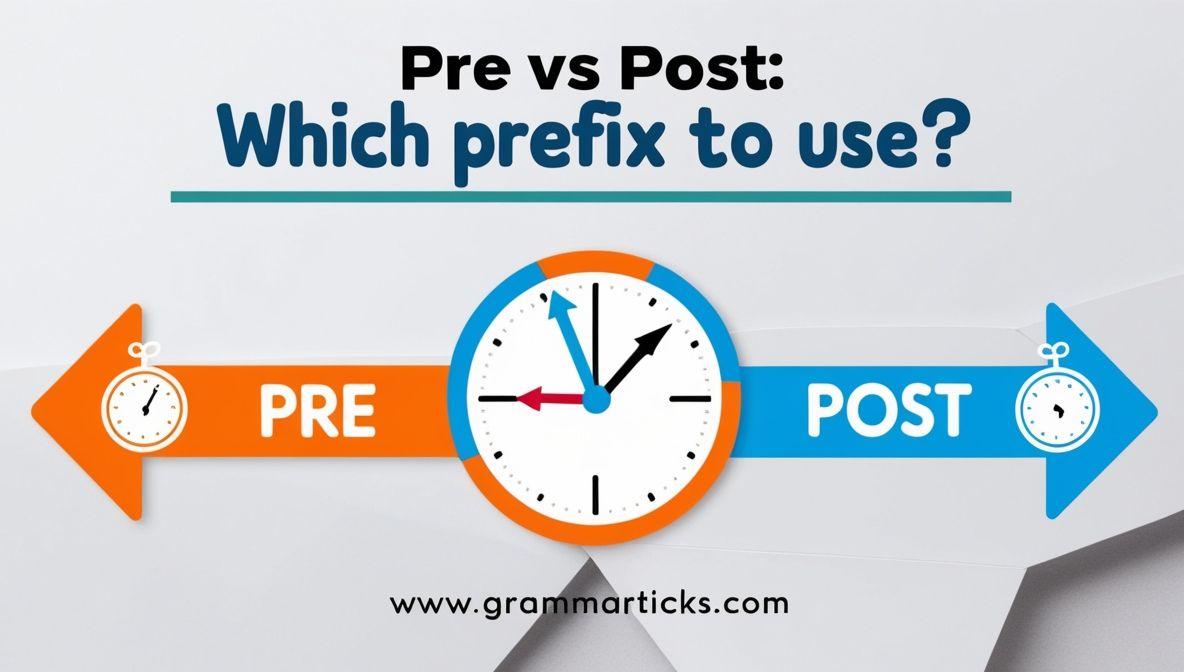Understanding the difference between Pre vs Post can make a huge difference in how clearly you communicate. These tiny but powerful prefixes in English carry a lot of weight because they indicate time whether something happens before or after an event. Getting them right helps avoid confusion and keeps your writing sharp.
Both the pre prefix and post prefix come from Latin roots and serve as prefixes indicating time. While pre means “before,” signaling preparation or anticipation, post means “after,” often pointing to reflection or aftermath. Knowing when to use each one will improve your clarity and help you sound confident and precise.
What Pre and Post Mean
Both prefixes indicate time but at opposite ends of the timeline. The pre prefix means before, while the post prefix means after. Think of them as bookends in your sentences that tell your reader whether something happens ahead of or following an event.
These prefixes indicating time come from Latin, with pre meaning “before” and post meaning “after.” When you’re using pre and post, you’re setting a clear timeline that helps your reader understand when something happens relative to something else.
Pre and Post Difference Explained
The main difference lies in their position on the timeline. Use pre when talking about what happens before a key event, and post for what happens after. For example, pre-surgical care means the care given before surgery, and post-surgical care means the care after surgery.
Functionally, pre often suggests preparation or anticipation, while post refers to consequences or results. This subtle shift can change your sentence’s meaning dramatically.
Origins of Pre and Post Prefixes
Both prefixes come from Latin roots. The pre prefix comes from prae, meaning “before,” and the post prefix derives from post, meaning “after.” These Latin roots link to Proto-Indo-European prefixes that helped form many English words.
Knowing their origin can help you remember their meaning. Think of pre as a miniature prologue prefix and post as a miniature epilogue prefix the parts that introduce or conclude a story.
Examples of Pre and Post in Everyday Language
Here are some practical examples to make things clear:
| Prefix | Example | Meaning |
|---|---|---|
| Pre | Pre-heat oven | Heat the oven before cooking |
| Pre | Pre-order | Order something before release |
| Post | Postpone meeting | Delay a meeting until after |
| Post | Post-workout meal | Meal eaten after exercise |
Notice how the pre vs post timeline is straightforward but crucial for clarity.
Common Scenarios of Confusion and Tips to Overcome Them
Imagine someone says, “I’ll do the post-heat instead of the pre-heat.” That sounds confusing because post-heat isn’t commonly used the oven heats before cooking, so pre-heat is correct.
Tip: When you’re unsure, ask yourself: Does this happen before or after the main event? If before, use pre; if after, use post. This simple question acts as a pre vs post mnemonic for quick decision-making.
Using Pre and Post for Clear Writing
Using these prefixes correctly improves sentence clarity and shows your reader exactly when things happen. Writers often confuse them, but keeping the timeline prefixes in mind will help you avoid mistakes.
Remember, pre sets the stage like warming up before a show. Post cleans up after the curtain falls reflecting on what happened or handling the aftermath.
Synonyms and Related Terms
Sometimes, synonyms can help understand or vary your language:
- Pre: before, prior to, ahead of
- Post: after, following, subsequent to
These can come handy if you want to avoid repeating prefixes but still express the same timing.
FAQs
No, pre means before, and post means after. Using them interchangeably confuses timing.
Mostly yes. Both are prefixes indicating time, but sometimes they can imply sequence or priority.
Think of pre as “before the main event” and post as “after the main event.” This helps in quick decisions.
Final Look
Getting the Pre vs Post prefixes right is easier than it seems. Remember, pre means before, and post means after. They help you explain when things happen in a clear way. Using them correctly makes your writing more precise and easier to understand. Next time you’re unsure about which prefix to use, just think about the timeline. Are you talking about something happening earlier or later? That simple question will guide you. Mastering pre vs post will boost your writing and help you communicate like a pro every time.

